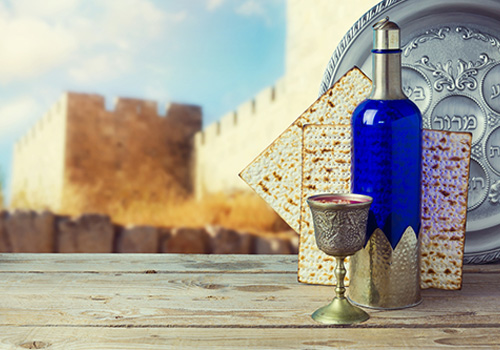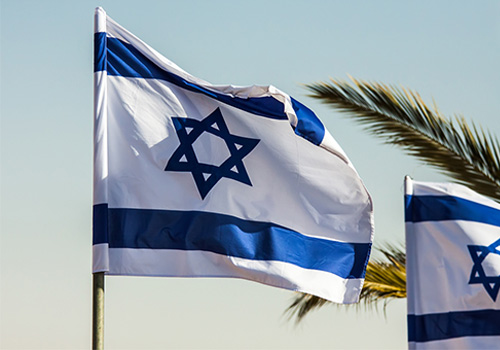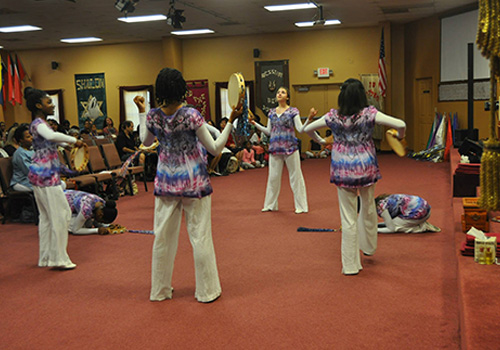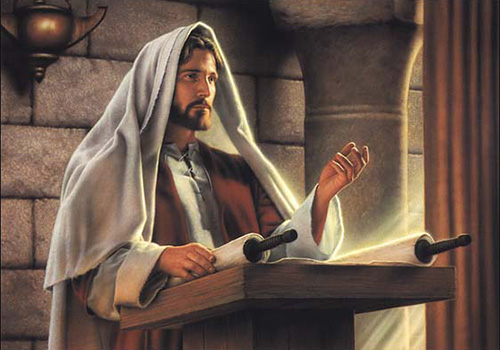Jewish Jewels Television

Airing throughout the U.S. since 1980, Jewish Jewels is a one-half hour award-winning Messianic Jewish Bible teaching program. Every week, the hosts, Neil and Jamie Lash, bring the teachings of the Tanach (Old Covenant) and Brit Hadasha (New Covenant) to life in a way that emphasizes the Jewish roots of faith in the Messiah Yeshua. While most of the viewers are believers in the Messiah Yeshua, Jewish Jewels also has a significant audience within the traditional Jewish community.
![]()
Alef- Bet & Hebrew
Hebrew (Iv-REET), the language of Moses and the Prophets of Israel, of King David and Yeshua (Jesus) of Nazareth, is a unique, holy language: “Leshon hakodesh.” Each of the 22 letters of the Hebrew alphabet (ALEF-BET) is a multifaceted jewel that includes a word picture, a sound, a numerical value, and a sacred meaning.
In this series, Neil and Jamie are joined by Israeli Hebrew scholar Dr. Danny Ben-Gigi who introduces each letter of the Alef-Bet and its word picture, along with fascinating insights and biblical truths.
Each Alef-Bet program also features an “Israel segment” filmed in the Holy Land. A prophetic “Banner segment,” with Elaine Caruso of Sion’s Rose Ministries, lifts up Yeshua HaMashiach as the “Alef and the Tav,” and the fullness of every letter in between. Today is the day to begin finding hidden treasure in the Word of God through the study of Hebrew, the language of the Bible.
View the Alef-Bet Program Directory
![]()
Biblical Feasts & Shabbat
 A study of Numbers 10:10 reveals that God instituted the festivals and new month celebrations to serve as reminders of Him and our obligations to Him. As such they serve as teaching aids for absorbing religious truths. The observance of the calendar events aids in this process and demonstrates that each day of our lives has tremendous significance before God. In addition, they can also serve to communicate God’s message to our children and friends.
A study of Numbers 10:10 reveals that God instituted the festivals and new month celebrations to serve as reminders of Him and our obligations to Him. As such they serve as teaching aids for absorbing religious truths. The observance of the calendar events aids in this process and demonstrates that each day of our lives has tremendous significance before God. In addition, they can also serve to communicate God’s message to our children and friends.
Rabbi Samson Hirsch explained it well:
“The catechism of the Jew consists of his calendar. On the pinions of time which bear us through life, God has inscribed the eternal words of his soul – inspiring doctrine, making days and weeks, months and years the heralds to proclaim his truths. Nothing would seem more fleeting than these heralds of time, but to them God has entrusted the care of his holy things, thereby rendering them more imperishable and more accessible than any mouth of priest, any monument, temple or altar could have done” (Judaism Eternal, Vol. 1, p. 3).
The B’rit Hadasha (New Testament) stresses that Yeshua (Jesus) fulfills the message of these calendar events, providing them with added significance. Hebrews (8:5; 10:1) speaks in terms of them being “Shadows of good things to come,” that is, they highlight the Messiah.
Follow Neil and Jamie as they explain both the normative Jewish and Messianic Jewish understandings of the seven feasts of the Lord (Leviticus 23), as well as the two extra Biblical feasts of Hanukkah and Purim. You won’t want to miss it!
View the Biblical Feasts & Shabbat Program Directory
![]()
Blessings
 B’rakhot or blessings have been divided into three categories since 15th century Spain. At this time Rabbi Abravanel identified blessings as follows: 1) God to people, 2) People to God, and 3) People to people. When we think of blessings, most of us think of the first group. We realize that all blessings flow from the hand of a good God. A verse in the B’rit HaDasha emphasizes this fact: “Every good gift and every perfect gift is from above, and comes down from the Father of lights, with whom there is no variation or shadow of turning” (James 1:17). God blessing mankind is obvious. Man blessing God is much less a part of the daily lives of most people today. Yet, b’rakhot are one of God’s chosen ways for people to live. They are a means of worship, a form of prayer, a way of giving pleasure to God, an acknowledgment of who we are and who He is, a way of expressing our love and appreciation of God, an expression of awe and reverence, and a way to integrate the secular and spiritual in our lives.
B’rakhot or blessings have been divided into three categories since 15th century Spain. At this time Rabbi Abravanel identified blessings as follows: 1) God to people, 2) People to God, and 3) People to people. When we think of blessings, most of us think of the first group. We realize that all blessings flow from the hand of a good God. A verse in the B’rit HaDasha emphasizes this fact: “Every good gift and every perfect gift is from above, and comes down from the Father of lights, with whom there is no variation or shadow of turning” (James 1:17). God blessing mankind is obvious. Man blessing God is much less a part of the daily lives of most people today. Yet, b’rakhot are one of God’s chosen ways for people to live. They are a means of worship, a form of prayer, a way of giving pleasure to God, an acknowledgment of who we are and who He is, a way of expressing our love and appreciation of God, an expression of awe and reverence, and a way to integrate the secular and spiritual in our lives.
All of our life should be a “Blessed Art Thou.” Since “The earth is the Lord’s, and all its fullness” (Psalm 24:1), it is reasoned that to enjoy anything on earth without saying a b’rakhah is tantamount to robbing God. Selah. The third category of b’rakhot, are the “people-to-people” b’rakhot. Aside from the blessing of children by their parents (especially in traditional Judaism), this type of b’rakhot has been relegated to the famous “Sneeze blessing”: “God bless you” in English, “Gesundheit” in German and “la-bri’ut” in Hebrew. This is unfortunate since people to people b’rakhot can be life changing. When one person blesses another, the one who speaks is actually requesting that God bless the recipient. A person who pronounces a b’rakhot over another imitates God, the originator of all b’rakhot. He takes on God’s very nature, and becomes himself a b’rakhah, a blessing. This should be a life goal for each one of us: to be a blessing. This seems to be the underlying idea in I Peter 3:8-9: “Finally, all of you be of one mind, having compassion for one another; love as brothers, be tenderhearted, be courteous; not returning evil for evil or reviling for reviling, but on the contrary blessing, knowing that you were called to this, that you may inherit a blessing.”
View the Blessings Program Directory
![]()
Israel
 While the world does not understand, or care, that Israel is not just “any other nation,” believers in Yeshua (Jesus) who love the Bible, God’s Word, must take a stand for what God Himself says about His Land. Israel is a “holy” land, a special land set apart for God. It is also a Promised Land. God’s choosing of Israel is irrevocable. It is not dependent, as some believe, on Israel’s own goodness or beliefs, anymore than our salvation depends on us. God made a unilateral covenant with Abram while he slept (Genesis 15). God cut the covenant with Himself; its fulfillment did not depend on Abram. The covenant included an unconditional promise of a specific land to Abraham and his descendants.
While the world does not understand, or care, that Israel is not just “any other nation,” believers in Yeshua (Jesus) who love the Bible, God’s Word, must take a stand for what God Himself says about His Land. Israel is a “holy” land, a special land set apart for God. It is also a Promised Land. God’s choosing of Israel is irrevocable. It is not dependent, as some believe, on Israel’s own goodness or beliefs, anymore than our salvation depends on us. God made a unilateral covenant with Abram while he slept (Genesis 15). God cut the covenant with Himself; its fulfillment did not depend on Abram. The covenant included an unconditional promise of a specific land to Abraham and his descendants.
This land—the land now known as Israel—had clear geographical boundaries. “On the same day the Lord made a covenant with Abram, saying: ‘To your descendants I have given this land, from the river of Egypt to the great river, the River Euphrates…’ ” (Genesis 15:18). “And I will establish My covenant between Me and you and your descendants after you in their generations, for an everlasting covenant, to be God to you and your descendants after you.” (Genesis 17:7) Also, God’s sovereignty concerning Israel is made clear in Psalm 105:7-11 which says: “He is the Lord our God; His judgments are in all the earth. He remembers His covenant forever, the word which He commanded, for a thousand generations, the covenant which He made with Abraham, and His oath to Isaac, and confirmed it to Jacob for a statute, to Israel as an everlasting covenant, saying, ‘To you I will give the land of Canaan as the allotment of your inheritance.’ ”
View the Israel Program Directory
![]()
Weddings & Marriage
 “Therefore a man shall leave his father and mother and be joined to his wife, and they shall become one flesh.” (Genesis 2:24; see also Matthew 19:5 and Ephesians 5:31.) The “one flesh” that the Bible is talking about is much more than physical. It is also emotional and spiritual. The ultimate purpose of the one flesh marriage relationship is to portray a divine reality: the relationship of the Messiah Yeshua and His Bride (the Body of believers).
“Therefore a man shall leave his father and mother and be joined to his wife, and they shall become one flesh.” (Genesis 2:24; see also Matthew 19:5 and Ephesians 5:31.) The “one flesh” that the Bible is talking about is much more than physical. It is also emotional and spiritual. The ultimate purpose of the one flesh marriage relationship is to portray a divine reality: the relationship of the Messiah Yeshua and His Bride (the Body of believers).
The two “I”s that stand under a huppah (wedding canopy) should ideally leave as a “We.” So too is our relationship with the Messiah that the “I” in us should die when we yield our lives to the Heavenly Bridegroom. See Galatians 2:20. Be blessed as you learn the art of the wedding ceremony and a Godly marriage!
View the Weddings & Marriage Program Directory
![]()
Worship & Dance
 In the Holy Scriptures, God exhorts His people time and time again to worship Him in the dance. He told them the following through King David in Psalm 149:2-3: “Let Israel rejoice before Him who made her, let the children of Zion be joyful in their King. Let them praise His name in the dance.” Again, in Psalm 150:4 we read: “Praise Him with the timbrel and dance.” The ancient Israelites obeyed the Word of the Lord. They danced at every joyous occasion. There were ritual dances, harvest dances, wedding dances, dances for warfare, victory dances, even dances at the digging of wells (Numbers 21:17). In Judges 21:19-23 we are told that the maidens of ancient Israel went up to Shiloh each year for the Lord’s Feast to “dance in dances” (la-CHUL-bim-cho-LOT) before the Lord. Whenever Israel won in battle, dance was a primary expression of gratitude to the Lord and a testimony to other nations that the God of Israel was the true God. I Samuel 18:6 shows us an example of this type of dancing: “and it came to pass as they came, when David was returned from the slaughter of the Philistine, that the women came out of all cities of Israel, singing and dancing, to meet King Saul, with tabret, with joy and with instruments of music.”
In the Holy Scriptures, God exhorts His people time and time again to worship Him in the dance. He told them the following through King David in Psalm 149:2-3: “Let Israel rejoice before Him who made her, let the children of Zion be joyful in their King. Let them praise His name in the dance.” Again, in Psalm 150:4 we read: “Praise Him with the timbrel and dance.” The ancient Israelites obeyed the Word of the Lord. They danced at every joyous occasion. There were ritual dances, harvest dances, wedding dances, dances for warfare, victory dances, even dances at the digging of wells (Numbers 21:17). In Judges 21:19-23 we are told that the maidens of ancient Israel went up to Shiloh each year for the Lord’s Feast to “dance in dances” (la-CHUL-bim-cho-LOT) before the Lord. Whenever Israel won in battle, dance was a primary expression of gratitude to the Lord and a testimony to other nations that the God of Israel was the true God. I Samuel 18:6 shows us an example of this type of dancing: “and it came to pass as they came, when David was returned from the slaughter of the Philistine, that the women came out of all cities of Israel, singing and dancing, to meet King Saul, with tabret, with joy and with instruments of music.”
In Judges Chapter 11, we see an example of a dance of hospitality or greeting as Jepthah’s daughter welcomed her father home. The procession, as a primary type of Hebrew dance, was a part of major festivals such as Passover. Pilgrims were led up to Jerusalem by flutes and pipes and timbrels played by the women. They danced as they made their way to Zion (Isaiah 30:25). Some of the Old Testament prophets experienced ecstatic dance as part of the intimacy of their relationship with God. In I Samuel 10:5, for example, Samuel tells a newly anointed King Saul that he would meet a company of prophets coming down from the high place. They would be preceded by a psaltery, a tabret, a pipe, and a harp. In Hebrew, there is little doubt that the prophets were dancing in some sort of enraptured way. Join us as we learn how to dance with the Lover of our souls!
View the Worship & Dance Program Directory
![]()
Yeshua in the Torah
 Can Yeshua (Jesus) be found in the Torah, the first five books of the Bible? Neil and Jamie answer with a resounding, “Yes!” Yeshua can be found in shadows and types, Messianic prophecies, and even pre-incarnate appearances, especially as the mysterious “Angel of the Lord.”
Can Yeshua (Jesus) be found in the Torah, the first five books of the Bible? Neil and Jamie answer with a resounding, “Yes!” Yeshua can be found in shadows and types, Messianic prophecies, and even pre-incarnate appearances, especially as the mysterious “Angel of the Lord.”
Yeshua Himself said to His Jewish con-temporaries: “You search the Scriptures, for in them you think you have eternal life; and these are they which testify of Me.” John 5:39 He also said, “For if you believed Moses, you would believe Me, for he wrote about Me.” John 5:46
The YESHUA IN THE TORAH SERIES includes live footage of a Torah service at Temple Aron HaKodesh in Fort Lauderdale, Florida, as well as Davidic praise and worship in the sanctuary. Neil gives a short d’rash on the weekly Torah portion, and Jamie interviews local Jewish believers, many of whom are over the age of seventy! Rejoice with Messianic Jews who have met Yeshua HaMashiach, the Living Torah, the Word that became flesh to dwell among us and save us from our sin.
View the Yeshua in the Torah Program Directory
![]()
More Programs
 To the left are just a few of our Angel Awards given for broadcast excellence. Airing throughout the U.S. since 1980, Jewish Jewels is a one-half hour award-winning Messianic Jewish biblical teaching program. Every week, the hosts, Neil and Jamie Lash, bring the teachings of the Tanach (Old Covenant) and Brit Hadasha (New Covenant) to life in a way that emphasizes the Jewish roots of faith in the Messiah Yeshua. While most of the viewers are believers in the Messiah Yeshua, Jewish Jewels also has a significant audience within the traditional Jewish community.
To the left are just a few of our Angel Awards given for broadcast excellence. Airing throughout the U.S. since 1980, Jewish Jewels is a one-half hour award-winning Messianic Jewish biblical teaching program. Every week, the hosts, Neil and Jamie Lash, bring the teachings of the Tanach (Old Covenant) and Brit Hadasha (New Covenant) to life in a way that emphasizes the Jewish roots of faith in the Messiah Yeshua. While most of the viewers are believers in the Messiah Yeshua, Jewish Jewels also has a significant audience within the traditional Jewish community.



